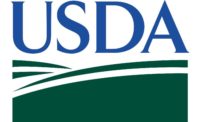
USDA to implement new COOL guidelines
U.S. Agriculture Secretary Tom Vilsack has announced that the USDA will be implementing country-of-origin labeling laws effective March 16. The COOL regulation requires country of origin labeling for numerous food products, including muscle cuts and ground beef (including veal), pork, lamb, goat, and chicken. In a letter to the meat-processing industry, Vilsack brought up areas of the COOL laws that are a concern to him, and he asked for processors to comply with several additional voluntary guidelines.
In the letter, Vilcask wrote: “In particular, I am concerned about the regulation's treatment of product from multiple countries, exemptions provided to processed food, and time allowances provided to manufacturers for labeling ground meat products.
“In light of these concerns, I am suggesting, after the effective date of the final rule, that the industry voluntarily adopt the following practices to ensure that consumers are adequately informed about the source of food products:
“Labeling of product from multiple countries of origin: In order to provide consumers with sufficient information about the origin of products, processors should voluntarily include information about what production step occurred in each country when multiple countries appear on the label. For example, animals born and raised in Country X and slaughtered in Country Y might be labeled as 'Born and Raised in Country X and Slaughtered in Country Y.'
“Processed Foods: The definition of processed foods contained in the Final Rule may be too broadly drafted. Even if products are subject to curing, smoking, broiling, grilling or steaming, voluntary labeling would be appropriate.
“Inventory Allowance: The language in the Final Rule allows for ground meat product to bear the name of a country, even if product from that country was not present in a processor's inventory, for up to 60 days. This provision allows for labels to be used in a way that does not clearly indicate the product's country of origin. Reducing the time allowance to 10 days would limit the amount of product with these labels and would enhance the credibility of the label.
“The Department of Agriculture will be closely reviewing industry compliance with the regulation and its performance in relation to these suggestions for voluntary action. Depending on this performance, I will carefully consider whether modifications to the rule will be necessary to achieve the intent of Congress.”
“I strongly support Country of Origin Labeling - it's a critical step toward providing consumers with additional information about the origin of their food,” said Vilsack in a statement. “The Department of Agriculture will be closely reviewing industry compliance with the rule and will evaluate the practicality of the suggestions for voluntary action in my letter.”
Source: U.S. Department of Agriculture
National Beef, JBS move on after failed acquisition
After the long-planned acquisition of National Beef Packing Co. by JBS fell through last week, the Kansas City-based processor is moving forward and looking forward to the future.
In a statement, John Miller, CEO of National Beef, said that, “this development has re-energized our management team. With our strong liquidity position and numerous opportunities to grow our business – both internally and externally – we are eagerly looking forward to building on our value-added model while continuing to focus on serving the needs of our customers.”
Steve Hunt, CEO of U.S. Premium Beef, the majority owner of National Beef, said, “although this is not the outcome we anticipated, we are excited to continue the growth and success of our business on a stand-alone basis. As demonstrated by our fiscal year 2008 and first quarter 2009 financial results, National Beef’s value-added business model, rooted in strong relationships with cattle producers and beef customers, continues to generate industry-leading profits.”
JBS, the Brazilian parent company of JBS-Swift, announced its intentions to acquire National Beef March 4, 2008. The company announced it was backing away from the agreement last week after discussions with the U.S. Justice Department about gaining approval to complete the transaction.
JBS said U.S. authorities insisted it sell two of its eight North American units so that it did not surpass the size of Tyson Foods Inc. and Cargill Inc., after which “it decided not to go forward with the
acquisition.”
“We fought hard, but unfortunately the Department of Justice wanted to keep us the same size as Tyson and Cargill,” said JBS President Joesley Mendonca Batista.
Sources: National Beef Packing Co., Reuters
Sanderson Farms starts Pull from the Pantry program
In order to help families prepare meals at home while juggling packed schedules and dealing with economic issues, Sandersons Farms has introduced the Pull From The Pantry program. The program will help people by providing recipes made with inexpensive ingredients commonly found in most kitchens.
ConAgra recycled frozen food trays win award
The post-consumer recycled plastic is used in nearly all of the company’s frozen meal trays for Healthy Choice, Banquet, Kid Cuisine and Marie Callender’s products. Traditionally, frozen meal trays have been made of crystallized PET plastic, a material that uses only newly produced plastics and that requires more energy and resources to produce. ConAgra Foods is the only company in North America using post-consumer recycled plastic in frozen meal trays. The company began transitioning to the new trays in June, 2008 and are now being produced using the recycled plastic.
“Our frozen meal trays with post-consumer recycled material are one small part of ConAgra Foods’ effort to reduce waste and positively impact the environment,” said Gail Tavill, ConAgra Foods vice president, Sustainability. “We are proud that the Institute of Packaging Professionals is recognizing our efforts, and we’re pleased to accept the Ameristar award,” she added.
Source: ConAgra Foods Inc.
By Sam Gazdziak



